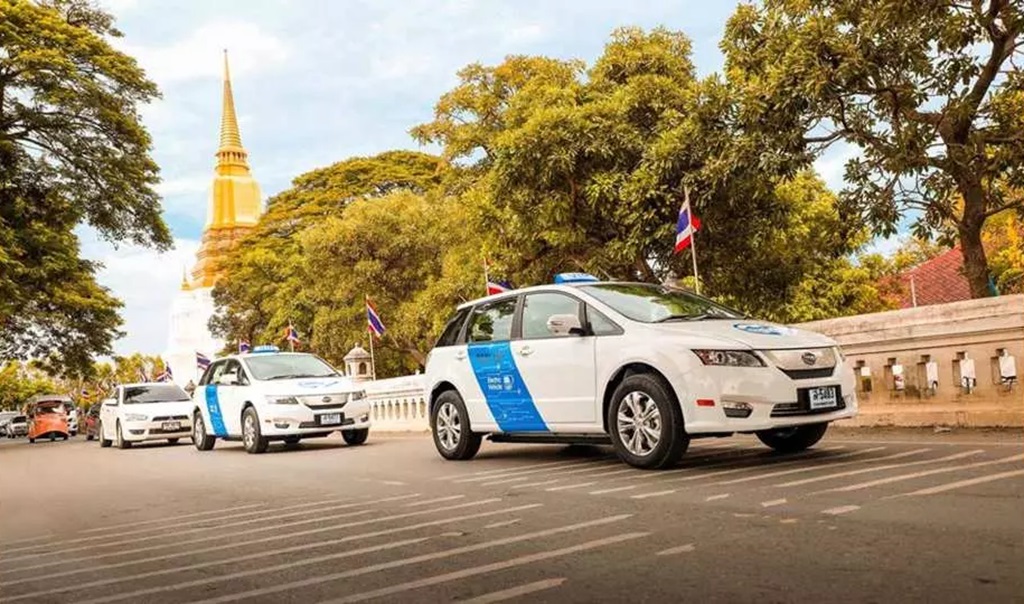Amid the congestion and bustle of international travel at Bangkok’s Suvarnabhumi Airport, a sleek, white EV taxi fleet adds a new touch to the runway. These vehicles, manufactured by a major Chinese automaker, have quickly become a symbol of environmentally responsible mobility at Thailand’s busiest airport.
Suvarnabhumi Airport is Thailand’s gateway, admitting approximately 50 million passengers annually. Recognizing the need for sustainable transport options, Airports of Thailand (AOT) has partnered with China’s GAC Aion to launch electric taxi services in January of this year. The program intends to improve the passenger experience and move the airport toward a more environmentally friendly future.
Suchat, 58, is a Bangkok EV taxi driver with eight years of experience. While he owns seven combustion engine cabs, his recent GAC Aion EV taxi purchase represents a big change in his path.
Reflecting on his experience over the last two months, Suchat was pleased with the electric taxi’s performance. “It’s powerful, quick off the mark, and offers ample space inside — a perfect blend of comfort and functionality,” he said.
According to Suchat, EV taxis are unique in their cost-effectiveness. “Monthly fuel and maintenance expenses for typical combustion engine taxis can reach 20,000 Thai Baht (about $571).
In contrast, the EV taxi service requires less maintenance and relies purely on charging. This corresponds to a huge cost decrease, approximately one-third less every month,” he said.
Kerati Kijmanawat, president of AOT, stressed the company’s commitment to encouraging sustainable tourism.
The installation of electric taxis at Suvarnabhumi Airport is a response to government policies and a proactive step toward establishing the airport as an environmental exemplar in Thailand.
Aside from providing electric taxi services, the AOT has invested in infrastructure to assist electric vehicles (EVs). The airport’s long-term parking area now features sixteen 40-kilowatt chargers and two 150-kilowatt chargers.
Thailand’s automotive sector has seen a spike in electric vehicle usage, with Chinese automakers at the forefront.
In 2023 alone, pure electric car sales in Thailand hit 73,000 units, representing a phenomenal 603.66 percent growth over the prior year. Notably, over 80% of these automobiles are Chinese brands, indicating a significant shift in the nation’s automotive preferences.
In September 2023, GAC Aion debuted its first foreign model in Bangkok. Construction on the GAC Aion Thailand plant project in Rayong Industrial Park, eastern Thailand, began earlier this year.
Ma Haiyang, general manager of Aion (Thailand), stated that the collaboration between GAC Aion and Thailand is consistent with the country’s objective for ecologically friendly transportation.
Currently, Aion has supplied over 1,000 EV taxis in Thailand. According to plans, electric taxis will be gradually introduced to additional Thai airports and throughout the country in the future.
According to a government initiative, Thailand plans to turn 30% of its 2.5 million automobiles produced annually into EVs by 2030. Thailand’s tax cuts and incentives have already attracted several Chinese automakers.
In recent years, China’s EV manufacturers have expanded into public transportation in Southeast Asia’s second-largest economy, with BYD exporting electric buses and SAIC’s MG selling electric taxis.
GAC Motor owns the Chinese electric vehicle brand Aion. It manufactures only inexpensive EVs for the mass market. Aion’s first model, the S, debuted in 2019 as a compact crossover SUV.
Since then, they’ve expanded their inventory to include sedans and larger SUVs like the LX Plus. Aion vehicles use modern EV technology and target younger buyers with striking styling and powerful infotainment systems.
While not yet a big name globally, Aion is helping boost EV adoption in China with its moderately priced, elegant EV taxi options.
Source: Xinhua







